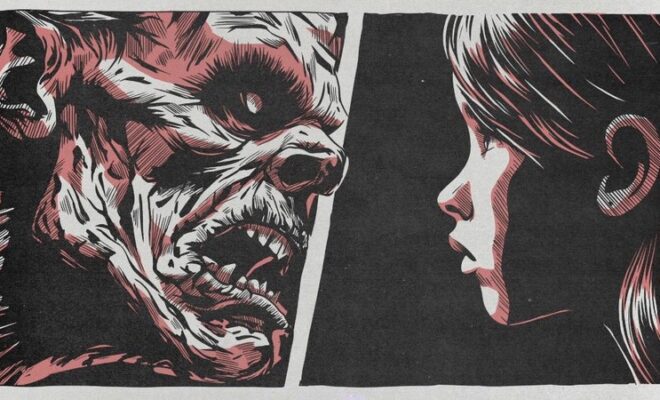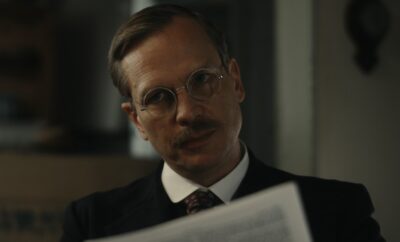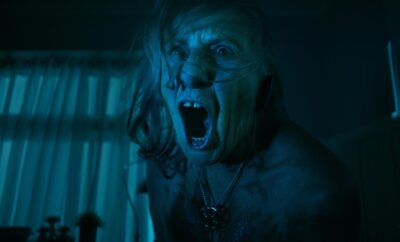 Coat of Arms Post
Coat of Arms Post
Interviews
Courtney Dixon – Depression is a Beast
By: Kelly Kearney
Q) Congrats on your documentary short Depression is a Beast landing at this year’s Tribeca Film Festival. What was your reaction when you found out the film was heading to the New York festival?
A) Thank you! I was stunned. When a film resonates with people, as a director, it feels like a huge win. But when it lands in a film festival like Tribeca, there is just immense pride. The ultimate sigh of relief!
Q) What was it that inspired you to make this deeply profound dive into depression? Why the interest in this particular subject?
A) I was going through postpartum depression a few years ago. I would be up late at night with a baby, and I remember reading an article in The New York Times about how horror films potentially being therapeutic for people with depression and anxiety. I had never thought of horror films in that way. I had a moment of thinking that I should make a PSA on depression through the style of the horror genre. Later, I connected with Jenna and shaped that idea around her real-life struggle on the topic.
Q) The film asks horror film actress Jenna Kanell to wrestle with that monster she calls depression and explain what it’s like living with that beast. The two of you must’ve worked closely on this. How did that come about?
A) My docs typically have a pretty heavy pre-production process. I often utilize post-trickery to make ideas come to life, so I go into production with a strong plan. Time was of the essence for her as she was booked on a feature. We did not have that face-to-face time to build a relationship at the start. However, she was so willing to be available in whatever way she could be. I would email her questions and she would send me audio-recorded responses. Each time I would push further on a feeling or a backstory that could help us build the visual story and the emotion. We did that about four or five times before we filmed the on-camera interview.
Q) Were you a horror film fan before working on this and meeting Jenna?
A) I’ve always been a fan of a good horror film! Although I’m not a horror enthusiast in the same way that true fans are, working on this short film has shown me firsthand how welcoming and supportive horror fans are of the genre and characters like Jenna. I definitely took more of a deep dive while I was going through postpartum depression.
Q) Jenna says in the film that “Horror [movies] became a safe space” for her as a pre-teen when she was forced to spend a few days per month at home debilitated from severe menstrual cramps. Like Jenna, many film fans find horror a calming watch or an escape from reality. When starting on this film, was the horror genre always in your mind or did that come from finding Jenna and her story?
A) That article was the catalyst for the horror angle on depression. It just clicked for me. I was so inspired by nostalgic horror films like The Twilight Zone, Creepshow and Poltergeist, to name a few. Before I had found Jenna, I planned to include horror nods across multiple subsets within the genre. I had many more ideas in my treatment, but once we talked, I wanted to honor what felt right for her story. So, I mapped out the visuals that fit her journey.
Q) I don’t think I’ve heard a better definition of depression when Jenna described it as “Genetics holds the gun and circumstance pulls the trigger.” That stayed with me. Is there something you learned about the subject through Jenna’s eyes that you might not have realized before?
A) The idea that you can negotiate with your monster stuck with me. There’s a powerful line where she addresses the monster directly and says, “You can hang out in the room with me, but you can’t sit in my lap anymore.” It’s the concept that some of us may always experience depression. The key is learning to live with it and thrive.
Q) This is Jenna’s story but told through your lens. A certain level of trust between the actor/subject and the director is needed to touch on some of the harder aspects of depression–which this film does brilliantly through a cornucopia of imagery and animation. How much input did Jenna have on some of that imagery? Did you two become creative partners in this?
A) I typically try to save all the visual elements as a final surprise for the subject. I want them to see their words come to life in a way they never expected. I created a visual paper edit based on her pre-interview so that she could see the direction mainly for the story structure. It is important to me that she felt her words were being accurately shaped. Because this is a sensitive topic, I did share a couple of style frames with Jenna so that I could make sure the imagery authentically represented her. I explained what would be happening on screen as we filmed it. But I think she was pleasantly surprised when it all came together.
Q) Did you have a goal with this piece that you hoped filmgoers would walk away feeling from their watch?
A) How depression manifests in each one of us is very personal. Treatment should be as well. Find what works for you and know that you can have these various tools in your toolkit. I wanted to make this topic approachable, but also conversational. The more we talk about it, the less stigma there will be on the subject.
Q) Are there any films or talent you are hoping to catch while you are at the festival?
A) I had the chance to watch Color Block, a feature by David Fortune, and it was absolutely beautiful. Salsa is a narrative short that was incredibly well done. There are so many talented filmmakers here this year!
Q) Are you working on any future projects we can look out for?
A) I have a short that is about to start the festival season, The Changebaker. The film is on the topic of immigration and follows a bakery owner who becomes an unlikely advocacy leader. I am really proud of it. I leaned into creative post-production to help tell this story in a memorable way.
Q) What would you like to say to those who watched and loved this short?
A) Thank you for your support! It is so motivating to hear when people appreciate my work and find it relatable in some way. I want the topic of mental health to be approachable. I hope this film can be a part of the conversation.





You must be logged in to post a comment Login